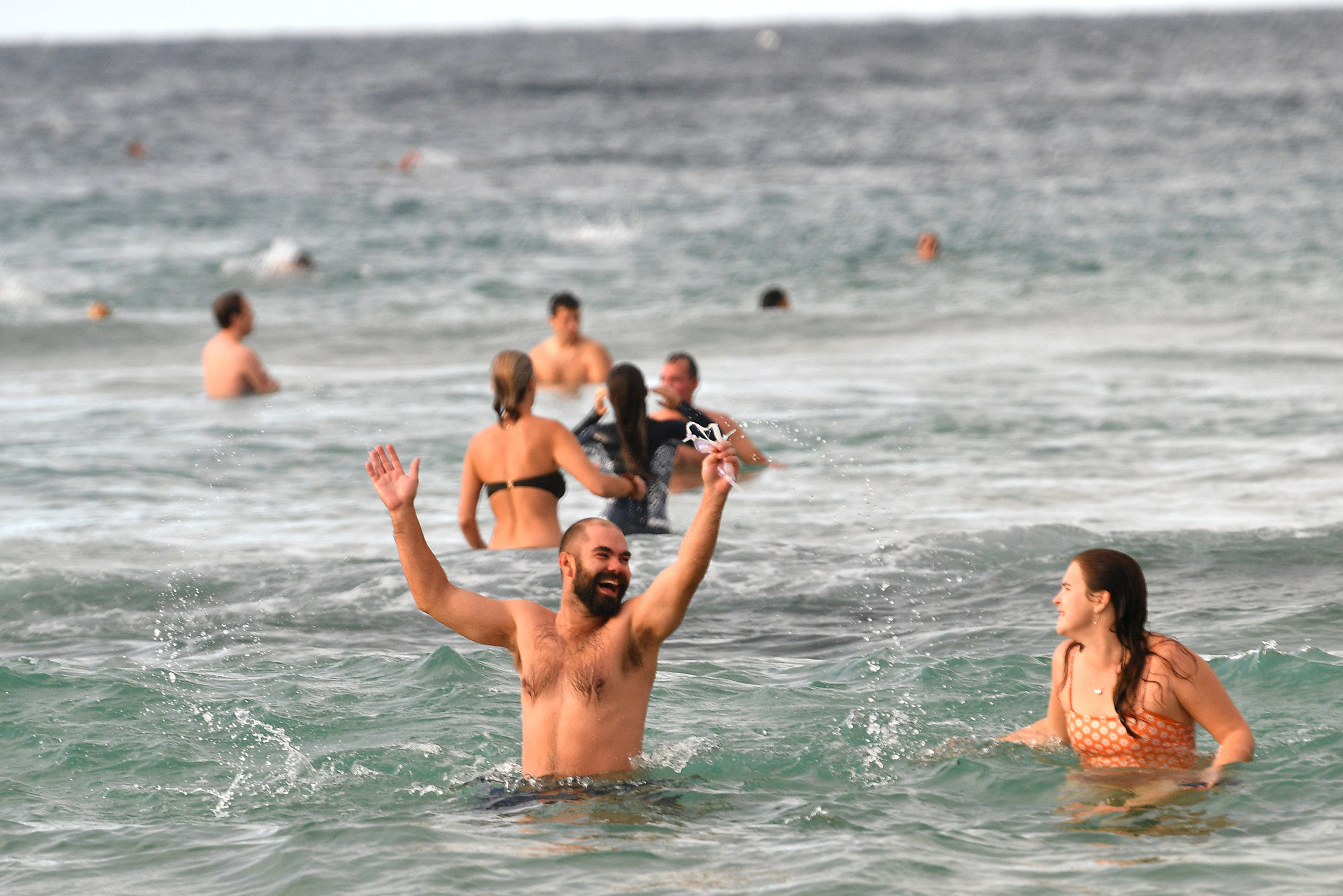Treading fine line, France, Spain to unveil virus lockdown exit
Beachgoers were back on Australia’s Bondi Beach after the government eased shut-in measures (Saeed KHAN)
Paris (AFP) – France and Spain were poised Tuesday to announce plans to ease strict lockdowns that have been in place for weeks, treading a fine line between allowing stalled economies to reboot while staving off another wave of contagion in the hard-hit countries.
Meanwhile US President Donald Trump said he may seek damages from China for the devastating coronavirus outbreak that has killed more than 56,000 in the US, the highest of any country in the world.
Beijing immediately hit back, accusing US politicians of “telling barefaced lies” about the virus that emerged in China late last year and has infected more than three million people and killed 211,000 globally.
More than half of humanity is under some sort of a lockdown to stem the spread of the deadly pandemic.
But with some countries reporting falling infection numbers, governments were beginning to chart their way out of the shutdowns that have pummelled the global economy.
Spain has already begun easing its tight lockdown and was set to announce more detailed plans on Tuesday, as was France, which has said it will begin to peel back confinement measures on May 11.
From next week, Italians will be able to exercise outdoors and visit relatives — but only if they wear masks and refrain from hugs and handshakes.
The three countries are the worst affected in Europe, reporting well over 20,000 coronavirus deaths each.
In Germany, which allowed some shops to reopen last week, experts warned against a rush to lift lockdown measures after new data showed a slight uptick in infection rates.
“We all need to take care that we don’t end up with more infections,” said Lothar Wieler, president of the Robert Koch Institute (RKI) for disease control.
– Recession fears –
With the world’s economic outlook looking bleak, calls are mounting in some quarters for governments to ease curbs to avoid a disaster in the hardest-hit sectors.
Forecasts warn of the worst global recession in a century, with oil prices tumbling and the travel and tourism sector badly hammered.
In the US, Trump again took aim at China’s handling of the crisis.
“We are not happy with China… we believe it could have been stopped at the source. It could have been stopped quickly and it wouldn’t have spread all over the world,” he said.
Asked about an editorial in the German press that called on China to pay Germany $165 billion in reparations for economic damage done by the virus, Trump said the US could take its own action.
“We are talking about a lot more money than Germany’s talking about,” he said.
“We haven’t determined the final amount yet. It’s very substantial.”
China’s foreign ministry was unequivocal in its response.
Spokesman Geng Shuang accused US politicians of having “only one objective: shirk their responsibility for their own poor epidemic prevention and control measures, and divert public attention”.
– ‘Human contact’ –
Some US states have moved to lift restrictions despite warnings from health experts — but to the delight of some citizens.
“We need human touch, human contact,” said 64-year-old Kim Kaseta, as she tucked into breakfast at a Waffle House restaurant in the US state of Georgia.
Most states do not yet have sufficient COVID-19 testing to consider relaxing stay-at-home orders, according to an analysis by Harvard researchers and the health news site Stat.
Trump said on Monday that testing was being rapidly expanded and that he expected to see a “lot” of schools open up, even if there is little time left in the school year.
Despite other European countries moving towards reopening schools and shops, British Prime Minister Boris Johnson said it was too early for the UK to follow suit.
Johnson, who returned to work Monday after his own battle with the virus, said he could not “throw away all the effort and the sacrifice of the British people and to risk a second major outbreak”.
His comments stood in contrast to those made by New Zealand’s Prime Minister Jacinda Arden, who said the nation had won the battle against “widespread, undetected community transmission”.
New Zealanders indulged in fast food and coffee shop treats for the first time in five weeks on Tuesday as the country lifted its strict lockdown.
“We see the difference in other countries and I don’t envy them, that’s for sure,” said Wellington resident Cheryl Robertson, who planned to celebrate her newfound freedom with a curry.
In Australia, hundreds of surfers and swimmers rushed back to the waves at Bondi Beach in Sydney, five weeks after police closed the area because of large crowds flouting social distancing rules.
“I’ve been excited for like a week, I was like: 7:30 right here,” Diane Delaurens told AFP, dripping after his early-morning surf session.
No one knows when the virus crisis will end as scientists race to develop treatments and, eventually, a vaccine.
Britain sounded the warning at signs of coronavirus-related syndrome emerging in children — including abdominal pain and inflammation around the heart.
They have required admission to intensive care, according to a report in the Health Service Journal.
“We’re doing a lot of research now. What I would also stress is that it is rare. Although it is very significant for those children who do get it, the number of cases is small,” Health Secretary Matt Hancock told LBC radio.
Underscoring global uncertainties, the president of the organising committee for the postponed Tokyo 2020 Olympics said the event will have to be cancelled if the pandemic is not brought under control by next year.
burs-hmn/mfp/jv
Disclaimer: Validity of the above story is for 7 Days from original date of publishing. Source: AFP.


